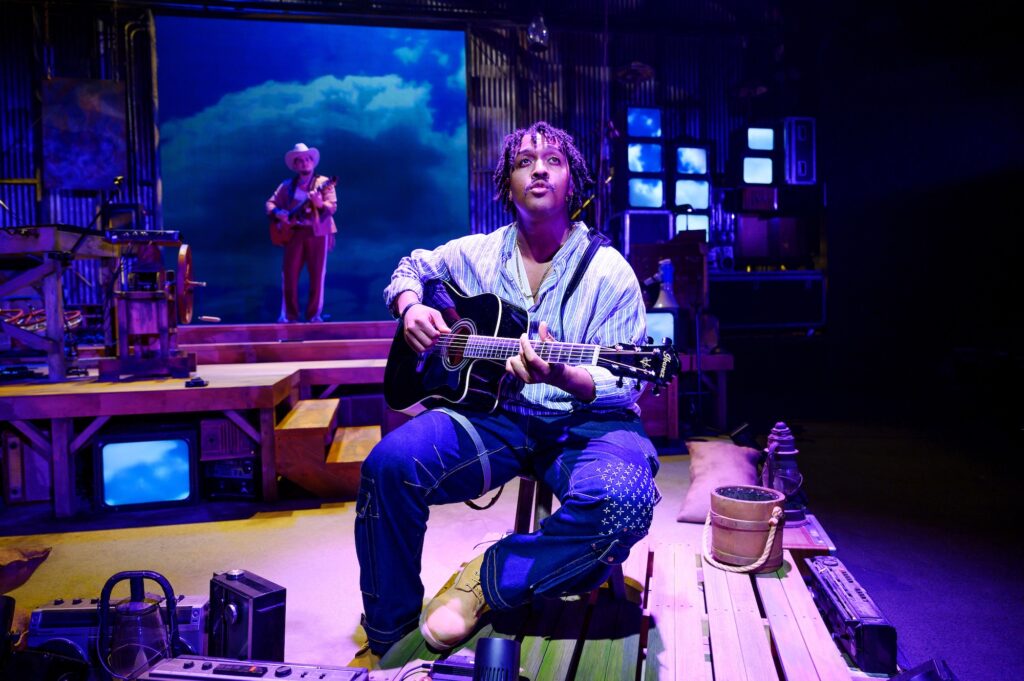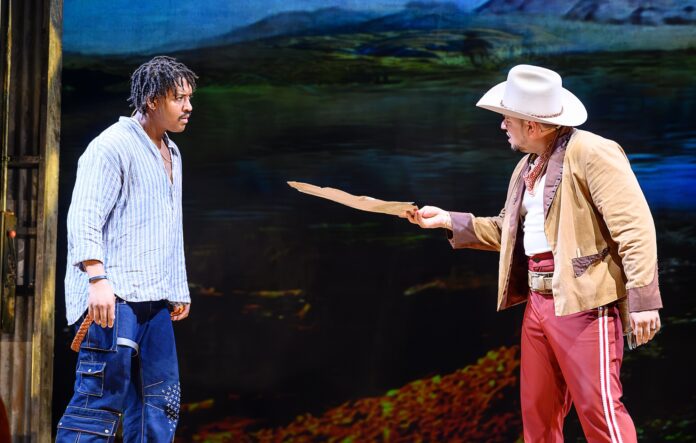Is “the post-Hamilton musical” a thing? It’s been almost a decade since Lin-Manuel Miranda followed up his then-decade-old In the Heights with a hip-hop-infused bio (co-starring Oakland’s own Daveed Diggs) of the original US statesman. Both the musical and Miranda’s contributions to the Moana soundtrack made the NY native a household name, but didn’t lead to a glut of rap-driven mainstream stage shows. Then again, given that Hamilton was–and continues to be–a lightning rod of debate regarding race and representation, perhaps we should be grateful that its influence has been limited to in-the-moment parodies rather than proper attempts to steal its thunder.
Whether or not Mexodus (West Coast premiere runs through October 20 at the Berkeley Rep) took influence from Miranda’s hip-hop historicity is up to interpretation. This isn’t the first show to seriously strip down its cast—just two performers, who do a lot on stage—to tell a wide-scope story. (What is theatre if not the quintessential medium of verisimilitude?) But whereas Miranda’s Tony-winning show is based around the lives of white men portrayed by a mostly-POC ensemble, Mexodus makes a POC story its rudimentary focus. As Broadway and Hollywood appear to think “diversity” means simply plopping POC into traditionally white stories (often as a means to side-step conversations about racism), the obvious solution of “Just tell more POC stories” often eludes them.
This show’s title comes from the little-known fact that not all enslaved Black people in the US were able to escape to the North for freedom in the Union. Rather, a considerable number of them went in the opposite direction, to Mexico, where slavery had already been abolished. Of course, there were often brutal slave-catchers in pursuit, willing to pay handsomely to any beleaguered local willing to make some quick cash.
Our story—told in English, Spanish, and several different musical forms—begins properly in 1851 Texas. The Lone Star State was once part of Mexico, but now, the white settlers despise the remaining Mexicans to the point where even enslaved people are taught to hate them. That includes Henry (Nygel D. Robinson), torn from his mother’s arms as a boy in Kentucky, now doing back-breaking labor on a Texas plantation. He knows enough Spanish to both work with and insult the (poorly) paid Mexican workers he often encounters.
When the slave-master’s wife looks at him with lust, the slave-master looks at him with rage. The resulting beating pushes Henry to the breaking point, leading him to kill the slave-master and run to the Rio Grande (“I’ll go to the land where slavery’s banned!”).
He nearly drowns crossing the border, before he’s found by farm worker Carlos (Brian Quijada), whose disdain for Black people is akin to Henry’s disdain for Mexicans. Still, Carlos nurses the runaway back to health so that he can leave sooner. After all, he surmises, it’s what his family would have wanted—the family he lost in the Mexican-American War years earlier.
War is a lingering specter in the show: not only is Carlos a veteran of Mexico’s last war, history buffs will know that both South America and the US proper have crucial conflicts right over the horizon. Just as the lands from which Carlos and Henry originate will be caught up in those conflicts, so too, are Carlos and Henry caught between forces beyond their control. The farm where Henry hides is almost a dead zone where he and Carlos can try their best to ignore the outside world, so long as they both keep their heads down and keep working. That’s what a lot of people think about world events they can’t change.
One can already guess that the pair’s animosity won’t last forever. What’s important is how it dissipates. Creators and co-stars Quijada and Robinson start the show on Riw Rakkulchon’s dirty storage shed-style set playing up to the audience. They joke, strum instruments, and live mix the audio samples they create. Over the course of the show, they’ll break from the main narrative to tell anecdotes about their own families, drawing direct connections between the fictional characters of their story and the reality of the legacy left over from this part of history.
The music they use is a skillful mix of hip-hop, jazz, rock, and several Mexican genres. In character, they continue to play the instruments, even the anachronistic electronic ones. Yet, the illusion of the story is never broken. Despite the fact that we audience members were invited, it feels as if we stumbled into two friends dramatizing an unsung chapter of history for their own amusement and ponderance.

Just as the musical genres they use evolved from specific origins (Negro spirituals and the African-born banjo, and the pre- and post-colonial traditions of Mexican natives), so too does the story evolve organically, even when using instruments out-of-time for its characters. Moments of silence are given delicate care and the music is never obtrusive. Likewise, the story and performers are entertaining and tense in their presentation and fluidity.
What the characters have in common is trauma. That can bring anyone together, but it’s always sad when it does.
Rather than waiting for one of Berkeley Rep’s ever-decreasing COVID-safe shows (which Mexodus will only have for Sunday shows through Sept. 29th), I attended opening night, where, once again, the majority of patrons were unmasked, including Berkeley mayor Jesse Arreguín. Still, the Rep’s strong HVAC system did well in the full house at the Peet’s Theatre. Over the course of the 90-or-so-minute show, my Aranet4’s CO² readings never exceeded 1,000ppm, finishing the show at 998ppm.
The pre-show curtain speech saw the Rep’s AD and ED giving a shoutout to the ACT, where Private Lives was opening the same night (I saw it the night after). It was unexpected (and a li’l corny), but I imagine it was done in the spirit of amity championed by this musical. The characters of Carlos and Henry weren’t offered the recognition given to the two most famous theatres in the Bay Area, but it’s encouraging that one of them chose to have their story told on its stage. Though short in length, Mexodus fills every minute of its runtime with a haunting, funny, sad, toe-tapping tale of PoC perseverance and PTSD – the kind of story we need more of.
MEXODUS’ West Coast premiere runs through October 20 in the Peet’s Theatre at Berkeley Rep. Tickets and further info here.






